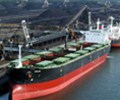

Chinese steel mills in various parts of the country have received verbal notices from regional customs for port clearance of stranded Australian coals, several sources familiar with the matter told S&P Global Platts Oct. 28.
The move could ease the tight domestic supply of coal, while lowering prices within a reasonable range, market participants said.
Several million metric tons of Australians coal has been waiting for clearance at China’s ports after the country imposed an unofficial ban on the Australian imports in October 2020.
The clearance would be granted at various ports in Northeast China, North China Plain, Zhejiang and Guangdong, market sources said. The regional customs offices were not immediately available for comment.
Three steel mills in Northeast and east China said they received a verbal notice from the respective customs departments in the morning Oct. 28. “Australian coals would be released today or tomorrow depending how fast they [customs] process it,” one of the end-user said.
Meanwhile, some other end-users said that only vessels with records of submitting port clearance applications prior to October 2020 would be released. Those without prior applications would be pending for discussion.
Several end-users across China confirmed the possible customs clearance of their cargos at the ports, according to a Chinese trader.
Sources surveyed at Jingtang — one of China’s major coking coal ports — said that the situation was improving but the details were still unclear.
“There are still more than 1 million mt of coking coal waiting for clearance at Jingtang port, and we are still waiting for notifications from customs,” a trader based in North China said.
Coking coal market impact
Market participants had mixed views on the impact of port clearance, with some saying it would hurt prices as more tonnage would be released, while other adopting a wait-and-watch approach amid the tight domestic supply.
“There are some 6 million mt of coals waiting to enter the market that could help ease the supply tightness”, an international trader said, adding that new bookings may be a viable next step, given the market expectation for higher Australian met coal supply from late-fourth quarter onward.
Australia was a major supplier of seaborne met coal to China before the unofficial import restriction, accounting for an average of 46% of the total Chinese imports between 2015-2020. The overall Chinese import volume declined 40% to 35 million mt in the first nine months of 2021, and comprised of inflows mainly from the US, Russia, Canada, and other origins, based on the official data.
“It is a positive move that feels like light at the end of the tunnel to the Chinese steelmakers, especially in light of such a tight domestic market at the moment,” an end-user in North China said.
Platts assessed PLV CFR China at $615/mt CFR China Oct. 27, up 203% between January and end-October.
Source: Platts